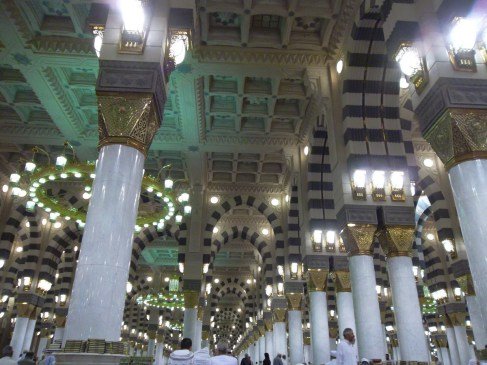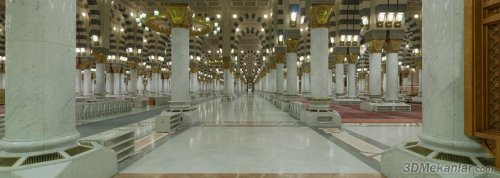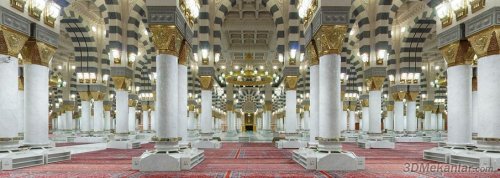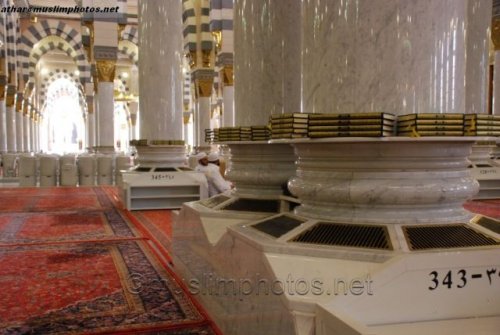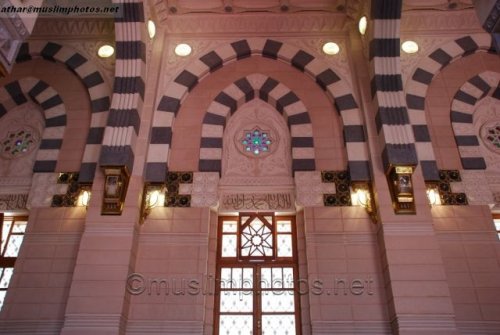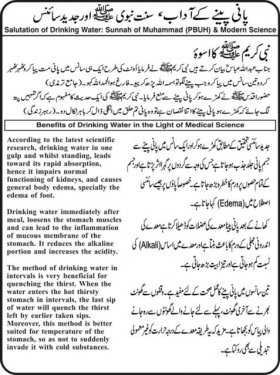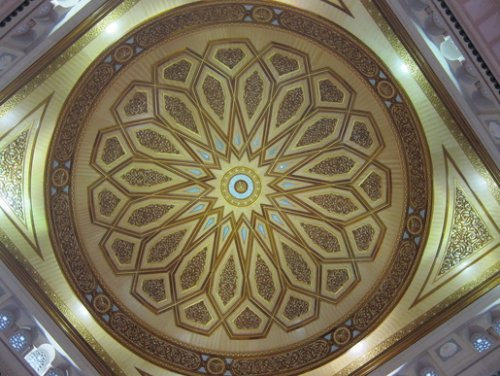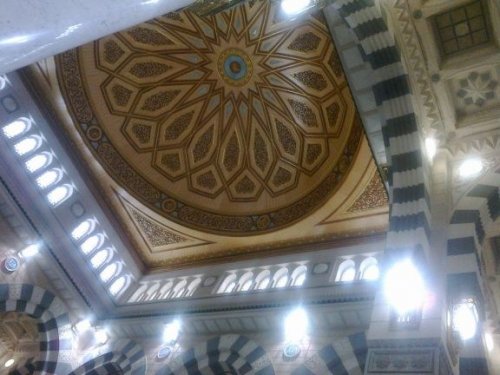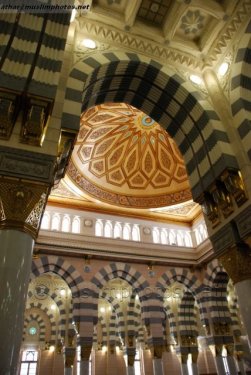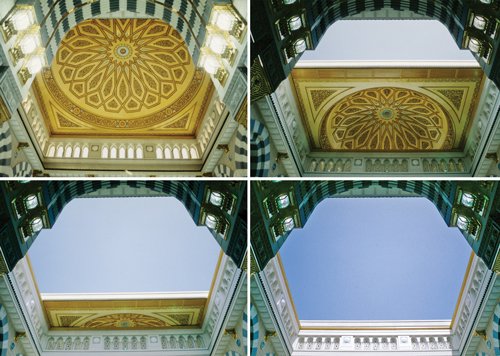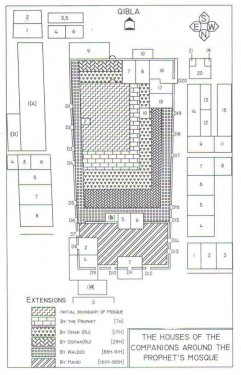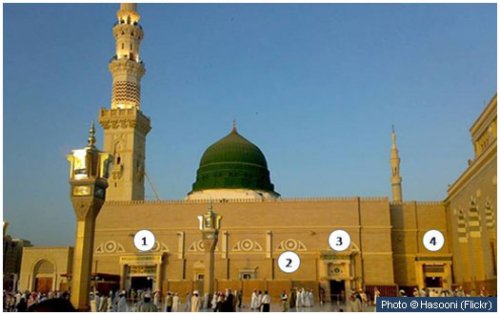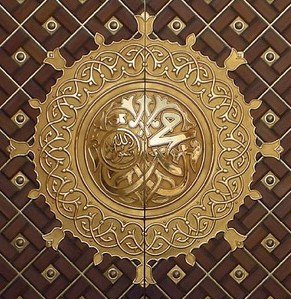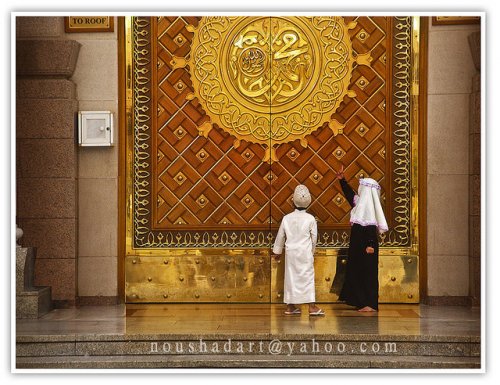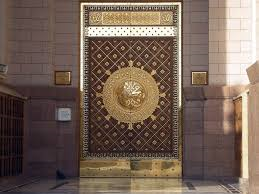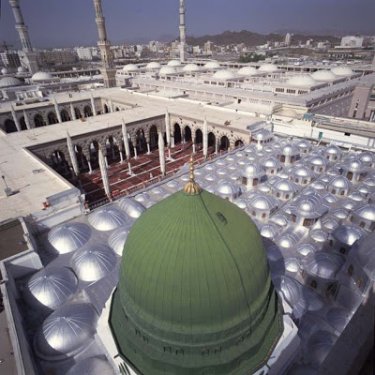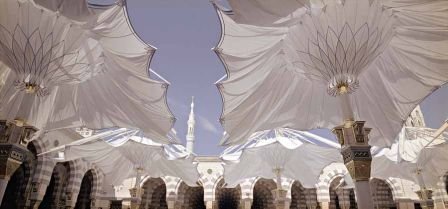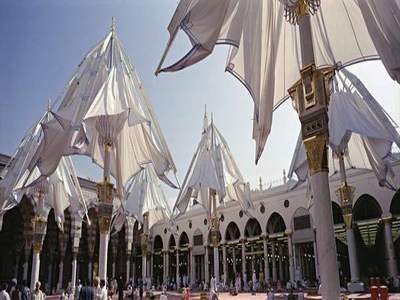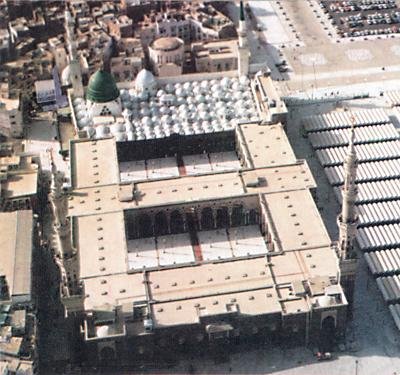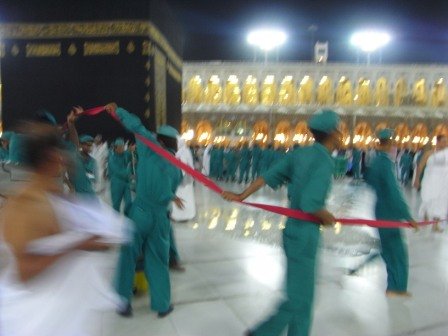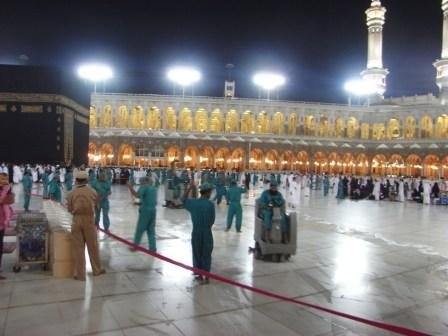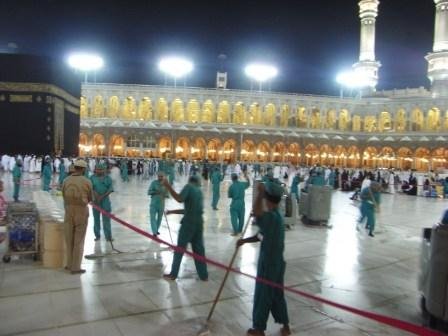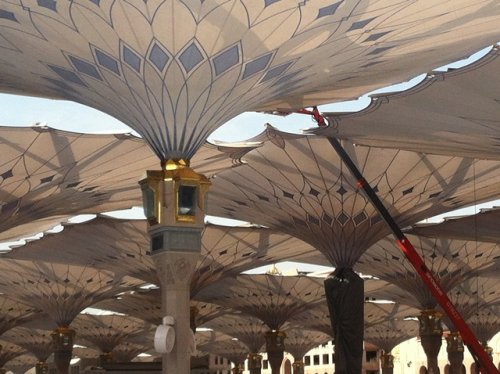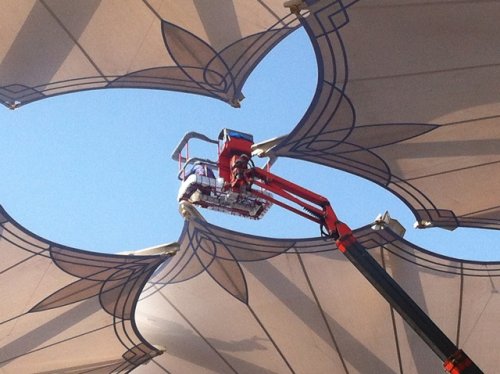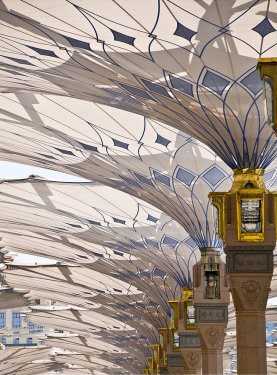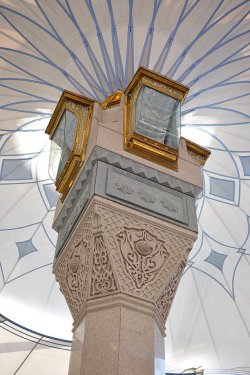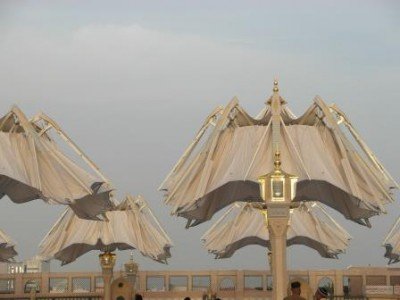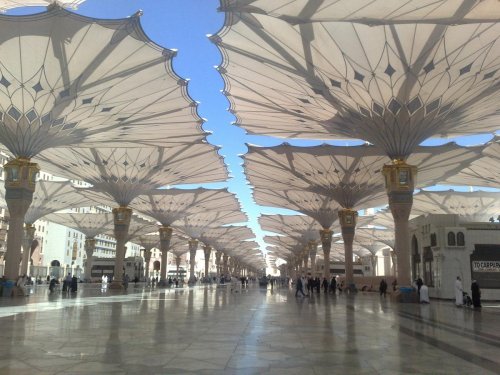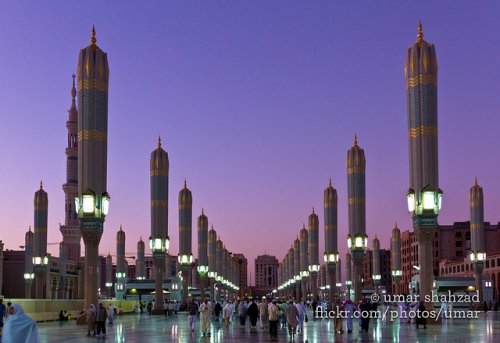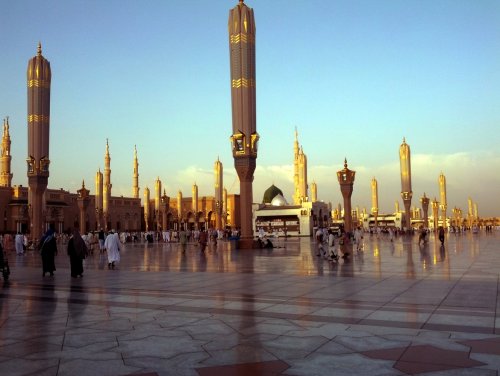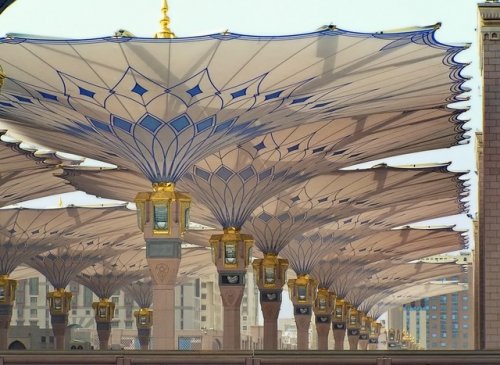-
Posts
8,465 -
Joined
-
Days Won
773
Content Type
Profiles
Forums
Events
Everything posted by ummtaalib
-
Interior of Masjid Nabawi A Virtual Tour of Masjid Nabawi Let not the heart be diverted by the glittering décor! Let the heart be humbled in the presence of the Beloved of Allah! sallallaahu 'alayhi wasallam!
-
-
1. To sit and drink. (Sahih al-Bukhari Hadith6452 and Sahih Muslim Hadith5242, 5247). Zamzam water and left over water in the utensil used for Wudhu are excluded from this. 2. To drink with the right hand. (Sahih al-Bukhari Hadith5380; Sahih Muslim Hadith5233) 3. To take 3 sips (or more in odd numbers). (Sahih al-Bukhari Hadith5631; Sahih Muslim Hadith5255) 4. To say Bismillah before drinking. (Sahih al-Bukhari and al-Azkaar; Fath al-Baari vol.10 pg.117) 5. To say Alhamdulillah after drinking. (Ibnus-sunni Hadith472; Majmauz-zawaaid vol.5 pg.81; Sunan al-Tirmidhi Hadith1885; Fath al-Bari vol.10 pg.117 Hadith5631) 6. If there are several people who are going to share the drink, it should be given to the one on the right. (Sahih al-Bukhari Hadith5612; Sahih Muslim Hadith5257) 7. The one who is distributing the water (or food) should himself drink after everyone. (Sunan al-Tirmidhi Hadith1894) 8. To recite this Dua, after drinking water (not other drinkables) is also Sunnah Alhumdollilah hil lathee sakaana, uthban foraatun, bi rahmatihi, wa lam yaj alhu milhan ujaajan bi thunoobina All praise is due to Allah, Who of His Mercy has granted us sweet and pleasant water to drink and did not make it bitter and salty due to our Sins. (Roohul Ma’ani, pg.149, 27th Para ) (reviveasunnahblog)
-
Is it Sunnah to Drink water after having meals Question Is drinking water sunnat after food or one should not drink water after food? In the name of Allah, the Most Gracious, the Most Merciful. Assalamualaikum Warahmatullahi Wabarakatuhu Allamah Ibnul Qayyim رحمه الله has mentioned that the habit of Nabi Salallahu Alayhi Wasallam was that of not drinking immediately after eating as this is harmful to the digestion process.[1] However, if there is a pressing need to drink immediately after that, then only drink enough to quench the thirst. One may then drink after some time elapses. NOTE: This elapsed time is estimated to be 20-30 minutes. And Allah Ta’ala knows best Mufti Luqman Hansrot Fatwa Dept. efiqh
-
Sayyiduna Abu Hurayrah (Radiyallahu Anhu) reports that Rasulullah (Sallallahu Alaihi Wasallam) said: “When you finish eating, lick your fingers, for you do not know in which particle of food lies Barakah (blessings). In another Hadith narrated by Ibn Abbaas (Radiyallahu Anhu), Rasulullah (Sallallahu Alaihi Wasallam) said: “Barakah descends at the middle of the dish, so eat from its sides and do not eat from the middle” (So that Barakah remains throughout your meal) (Tirmizi)
-
The Sunnah Way of EatingThe Holy Prophet expressed dislike for over-eating and said that over-eating is ill luck and misfortune. In other words, a person who over eats will be followed by such faults and defects that he will have difficulty and hardship in every place and people will look at him in a bad way. The Holy Prophet used to eat with three fingers, and before wiping and cleaning his hand he used to lick his blessed fingers. Whenever food is very hot, it should be left covered for a while, so that the emission of steam finishes. In doing so, the Holy Prophet has said that this is a method in which barakah may be gained. Hazrat Anas has mentioned that, “I once saw the Holy Prophet sitting in a squatting posture and eating dates.” The posture mentioned means that when one keeps his calves straight and sits on his feet. Once in a gathering, the number of people eating increased, so the Holy Prophet sat with his blessed legs folded (as in Attahiyyat position in Salaah), the reason being that there is humility in sitting like this and there is consideration for other people who are also present because sitting in this manner creates more room for them. The people eating should not get up before the table cloth has been lifted. When one is eating with another person then he should not stop eating as long as the other person is eating, even though the stomach has become full, this is so that the other person does not feel ashamed. If one has to stop eating, then he should make an excuse One should not drink from a water container by putting his mouth on it. The same prohibition has been applied to placing the mouth on and drinking from a spouted jug, or a goblet meaning a long necked flask or a bottle etc. One should not breathe into a utensil or blow into it. One should also refrain from placing his mouth on a utensil that is cracked or broken. Many people have the habit of standing up and drinking, one should also refrain from this act. The Holy Prophet never found fault with food, if he liked it then he would eat it. If he did not prefer it, then he would just leave it without complaining. Hazrat Huzaifa has mentioned that the Holy Prophet prevented us from eating and drinking in gold and silver utensils. This order is for both men and women. May Allah Taa'la give us the ability to act upon these Sunnahs of Rasullullah . Ameen inter-islam
-
'Umar bin Abu Salamah (May Allah be pleased with him) reported: Messenger of Allah sallallaahu 'alayhi wasallam said to me, "Mention Allah's Name (i.e., say Bismillah before starting eating), eat with your right hand, and eat from what is near you." [Al-Bukhari and Muslim]. 'Aishah (May Allah be pleased with her) reported: Messenger of Allah sallallaahu 'alayhi wasallam said, "When any of you wants to eat, he should mention the Name of Allah in the begining, (i.e., say Bismillah). If he forgets to do it in the beginning, he should say Bismillah awwalahu wa akhirahu (I begin with the Name of Allah at the beginning and at the end)." [At-Tirmidhi and Abu Dawud].
-
Asslamo Allaikum, 38 year old Zareen Shaukat daughter of Br Khalid Shaukat (moonsighting.com) is in need of Kidney transplant. She is unemployed and her father's insurance won't cover her Health needs. She is in urgent need for a Kidney, if you are able to donate please email [email protected] She is in urgent need of $200,000 and money can be donated through this site Please make dua, **urgently** propagate this message and assist financially as best as you can. 19SEP2013 (14:00 GMT): I have discussed and confirmed it directly with Br Khalid Shaukat (moonsighting.com) via email Jazakallahu Khairun http://www.muftisays.com/forums/27-sharing-portal/7777-urgent-appeal-for-zareen-shaukat.html
-
Sliding Domes of Masjid Nabawi There are twenty seven sliding domes, the diameter of each is 14.7 metres and weigh 80 tons. They have an outside ceramic finishing made of Maple and Moroccan wood. The moving time for each is one minute electrically and thirty minutes manually. "Women's Guide in Madinah Munawwarah" Mufti Muhammad Faruq This picture was posted by Roukaya19 on muftisays.com A Dome Closing
-
Details of the Doors of Masjid Nabawi Click on picture to enlarge to see the position of the doors - marked D1, D2 etc. Omar bin Abdul Aziz (RU) installed twenty doors during the extension of the Prophet’s Mosque in 91 Hijrah. Eight of these doors were in the eastern wall. Similarly eight doors were in western wall of the Mosque. Remaining four doors were in the northern wall of the mosque. When Caliph Mehdi Abbasi further extended the Mosque in 165 Hijrah, he did not install any additional door. However, the location of these doors was somewhat changed as needed. Many historians have described the surrounding of the Mosque with reference to these twenty doors of Mehdi extension. Most of these doors assumed their names from the names of the companions or other persons whose homes happened to be situated near that door. Hence these doors were very helpful for the earlier scholars in searching for the location of various houses around the Mosque. It will, therefore, be very appropriate to describe these twenty doors one by one to make ourselves familiar with them. Eastern Doors Door No.1: It was called Bab-un-Nabi. This name does not mean that Prophet Mohammad (SAS) used to enter and leave his home through this door. In fact this door did not exist at the time of the Prophet (SAS). This door, however, assumed above name since it happened to be opposite to the Hujrah of Aisha (RUA). This door was closed during a later extension and a window was installed at its location. This window still exists in the eastern wall of the mosque and has the following writing on top of it. Al-Ahzab # 56 Allah sends His Graces on the Prophet (SAS) and also His Angels ask Allah to bless him. O you who believe! Send your Salat on him (ask Allah to bless him) and greet him with the Islamic way of greeting. Door No. 2: It was called Bab Ali since it was located opposite to Ali’s (RU) Hujrah. This door was also closed during a later extension and a window was also installed at its location. This window can be seen in the eastern wall of the present mosque. These two windows are between Bab Jibreel and Bab Baqee. Door No. 3: It was called Bab Jibreel and it does exist even now. Door No. 4: It was called Bab-un-Nisa and it does exist even now. Door No. 5: This was opposite to the house of Asma bint Hussain bin Abdullah bin Obaidullah bin Abbas (RU). Door No. 6: This door was opposite to the house of Khalid bin Waleed (RU). The following wording was written inside this door This extension is made by the order of Caliph Mohammad Mehdi Abbasi and was carried out by the workers of Basra during 162 H. This is where the Mehdi extension starts. (History of Madina by Ibn Shubba and Vafa-ul-Vafa) Door No. 7: This door was opposite to the route leading to open space used for toilet needs by women of Madina. Door No. 8: This door was opposite to the houses built on donated land. This was the last door in the eastern wall. Northern Doors Door No. 9: It was opposite to the house of Hameed bin Abudur Rehman bin Auf (RU). Door No. 10: It was opposite to the house of Abu Algais bin Mugheera. Door No. 11,12: Both these doors were opposite to the Hujrah of Caliph’s freed slave Khalisa. Western Doors Door No. 13: This was opposite to the house of Abdullah (RU) son of Jaafar bin Abi Talib. Door No. 14: It was opposite to house of Munira. Door No. 15: It was opposite to the house of Sakina bint Husain (RUA). Door No. 16: It was opposite to the house of Hassan bin Thabit (RU) who was a famous poet at the time of the Prophet (SAS). Door No. 17: It was called Bab Rahmat and it does still exist. Door No. 18: This was between Bab Abu Bakr (RU) and Bab Rahmat and was on the site of Bab Ziyad. Door No. 19: It was known as Bab Abu Bakr and it does still exist. Door No. 20: It was called Bab-us- Salam and it does still exist. Dr Imtiaz Ahmed
-
Doors on the Eastern Side This is a view of the eastern wall of Masjid-e-Nabwi showing current prominent doors, some of which were used at the time of the Prophet (peace and blessings of Allah be on him). 1. Bab-e-Baqi (Door of Baqi) This door was installed in 1408 AH and is exactly opposite to Bab-e-Salaam which is on the western side. This door is to facilitate the flow of people leaving the masjid after giving salutation to the Prophet (peace and blessings of Allah be on him) and his two companions. 2. Funeral place The Prophet (peace and blessings of Allah be on him) used to lead Salat-ul-Janaza at this site and the Sahaba continued this tradition. Abu Saeed Khudri (may Allah be pleased with him) described how and when this place was used for funeral services: “In the very beginning we used to inform the Prophet (peace and blessings of Allah be on him) when someone was near death. The Prophet (peace and blessings of Allah be on him) used to visit the ailing person and made supplication for his forgiveness. Many times the Prophet (peace and blessings of Allah be on him) stayed there till the completion of the funeral services. In this way the Prophet (peace and blessings of Allah be on him) had to wait there for a very long time at each such occasion. We, therefore, decided to take the body of the deceased person near the Hujrat (houses of the wives of the Prophet) so that the Prophet (peace and blessings of Allah be on him) can lead the salat more easily. The Prophet (peace and blessings of Allah be on him) started offering Salat-ul-Janaza in the area described above.” The Turks built an enclosure around the funeral courtyard which used to be open to worshippers. Recently however, it is used as a storage space for materials needed in Masjid-e-Nabwi. 3. Bab-e-Jibraeel (Door of Jibraeel) This door is also called Bab-un-Nabi since the Prophet (peace and blessings of Allah be on him) used to enter the masjid through this door. Jibraeel (upon him be peace) came to the Prophet (peace and blessings of Allah be on him) after the battle of Ahzab (the battle of the Confederates and also known as the battle of the Trench), and talked to the Prophet (peace and blessings of Allah be on him) at the door step of Bab-e-Jibraeel. It is mentioned in Bukhari as narrated by Aisha (may Allah be pleased with him), “After the battle of Ahzab, the Prophet (peace and blessings of Allah be on him) disarmed himself and took a bath. In the meanwhile, Jibraeel (upon him be peace) came riding a pony and talked to the Prophet (peace and blessings of Allah be on him) near the door step of of Bab-e-Jibraeel. Jibraeel (upon him be peace) said to the Prophet (peace and blessings of Allah be on him), “You have put away your arms but we (the angels) are still in battle uniforms. So you should come with us to attack the tribe of Banu Qurayza.” Aisha (may Allah be pleased with her) added, “I was looking at Jibraeel (upon him be peace) through the cracks in the door of my hut. Jibraeel (upon him be peace) was covered with dust.” 4. Bab-un-Nisa (Door of the Women) Umar (may Allah be pleased with him) expanded the masjid during 17 AH. He built this door at the end of eastern wall of the mosque. Women used to enter the masjid from this door and offered their salat in the last rows and thus were able to avoid contact with men. Abu Dawud mentioned that Umar (may Allah be pleased with him) said, “We should let the ladies use this door exclusively.” References: History of Madinah Munawwarah – Dr. Muhammad Ilyas Abdul Ghani islamiclandmarks.com
-
-
"Pointing" in the second last line needs an "n" Jazakallaahu khayran bro...very informative and beneficial
-
No I don't. I came across this and since it was a common question I added it. If you have any other information, please do add.
-
Open Courtyard inside Masjid Nabawi Ariel view showing the two open courtyards From AlMiskeenah These two photos (grabbed from online long ago…(apologies for not knowing who to thank for these) are of some of the six existing umbrellas in the two open courtyards inside Masjid Nabawi
-
Haram Cleaners in Action SubhanAllah, the area that Masjid al-Haram occupies on the earth must be the cleanest patch of land on the entire globe. Armies of diligent cleaners, brothers and sisters, are dusting, polishing, mopping, sweeping, vacuuming, washing and picking up all that is dropped 24/7. The efficient routine never ceases, and the care and love seen on all contibuting to this task is admirable. Their presence is evident in every direction one gazes; high above scaffolding meticulously cleaning each and every architectural feature and light fittings to all surfaces below. The antics of the brothers in the turquoise uniforms as they are engaged in the major cleaning mesmerize. Children laugh excitedly, adults stare in amazement as if watching a skillfully choreographed ballet. The display of dexterity and nimbleness as they contol all the props is a performance of agility and devotion, and a mastery of organization. ALMISKEENAH
-
Question: Is it allowed to wear different colours scarfs with a black abaya? Can we wear a black abaya with black designs on it? Is it allowed to wear a hoodie/sweater on top of the abaya? Answer:In the Name of Allah, the Most Gracious, the Most Merciful. As-salāmu ‘alaykum wa-rahmatullāhi wa-barakātuh. The dress of a woman should: 1) Conceal the body. 2) Be loose so that it does not reveal the shape and form of the body. 3) The dress should not attract the attention of men, for example having bright colours etc. According to the principals outlined above, it will be permissible for a woman to wear coloured scarfs , and abayas with black designs and hooded sweaters as long as they do not violate any of the above mentioned conditions. If any form of dress dose not confirm to these conditions, it will not be permissible. And Allah Ta’āla Knows Best Checked and Approved by, Mufti Ebrahim Desai. idealwoman.org
-
- 3
-

-
Question: How long can a mother breastfeed her child? Answer:In the Name of Allah, the Most Gracious, the Most Merciful. As-salāmu ‘alaykum wa-rahmatullāhi wa-barakātuh. The maximum time period for breast feeding is two lunar[1] years[2]. And Allah Ta’āla Knows Best Checked and Approved by, Mufti Ebrahim Desai.
-

Tragedy Of The Leicester Fire Deaths
ummtaalib replied to ummtaalib's topic in General Islamic Discussions
Welcome!! Jazaakillah for sharing! -

WOMEN - Tawāf Al-Ziyārah & Haydh (Menstruation)
ummtaalib replied to ummtaalib's topic in Hajj/Umrah
Hanafi Fiqh > Darulifta-Deoband.org My daughter performed haj with us last year during mina stay after arfat day she started menstural bleeding she was prevented from performing tawafe ziyarah. she performed sai and came back with us on 14 dulhijja.Whether her haj is valid? Answer (Fatwa: 913/596/H=1432) Her hajj was not complete rather she is still in the state of ihram. First of all, you (father) or any mahram should take her to perform tawaf ziyarah, only then her tawaf shall be done. Also, a dam (slaughtering an animal) shall be wajib due to delay. Rather if she has committed jinyat (an act against the ihram,) during this period, write it to us. Note: The answer is correct. Also, it should be noted that if your daughter is married then it shall not be lawful for her husband to have intercourse with her until she goes Makkah and performs tawaf. (Z) Allah (Subhana Wa Ta’ala) knows Best Darul Ifta, Darul Uloom Deoband -

How Should A Menstruating Woman Perform Hajj?
ummtaalib replied to ummtaalib's topic in Fiqh of Menstruation
Question Can i perform hajj including umrah whilst I am on my monthly menstrual cycle. Please state what i am allowed to do and what i am not allowed to do whilst on my period. Answer Bismillah Al-jawab billahi at-taufeeq (the answer with Allah’s guidance) Yes, you can perform all the rituals of Umrah and Hajj except Tawaf and Salah. Bukhari, Chapter: A menstruating woman will perform all the rituals of Hajj except Tawaf. A’ta says, Jabir (RA) narrates that A’isha (RA) was in the state of menstruation and she performed all of the rituals of Hajj except Tawaf and Salah. Narrated ‘Aisha: We set out with the Prophet for Hajj and when we reached Sarif I got my menses. When the Prophet came to me, I was weeping. He asked, “Why are you weeping?” I said, “I wish if I had not performed Hajj this year.” He asked, “May be that you got your menses?” I replied, “Yes.” He then said, “This is the thing which Allah has ordained for all the daughters of Adam. So do what all the pilgrims do except that you do not perform the Tawaf round the Ka’ba till you are clean.” (Al Kutub us Sitta, Bukhari, Book 6, Pg. 26) And Only Allah Ta’ala Knows Best. Moulana Qamruz Zaman London, UK -
The Courtyard Umbrellas The Courtyard Umbrellas in Masjid-e-Nabawi Mubarak are open from sunrise till Maghrib and then closed in the evening Closed Opening Opened Pictures from Below Being Cleaned
-
Question: I want to know with regards reading forty Salah in Masjidun Nabawy,what are the rewards? Answer: In the Name of Allah, the Most Gracious, the Most Merciful. As-salāmu ‘alaykum wa-rahmatullāhi wa-barakātuh. Hadhrat Anas (Radhiallahu Anhu) reports that Rasulullah Sallallāhu Alayhi Wasallam said: Whoever performs forty Salah in my Musjid(in succession),not missing any Salah, he is guaranteed freedom from Hell fire, redemption from punishment and he becomes immune to hypocrisy.”(Majma’uz Zawaaid) And Allah knows best, Mufti Ebrahim Desai Idealwoman.org
-
- 1
-

-

General Advice For Those Going For Haj And Umrah
ummtaalib replied to ummtaalib's topic in Hajj/Umrah
Reminders For The Hujjaj Here are some beneficial reminders for our brothers and sisters performing Hajj this year… 1. Intention: There is a Hadeeth which states, in the latter days, the people will go for hajj but their object will be four. The rulers will go to increase their power, the rich for trade and commerce, the poor for begging and the learned for name and fame. These things can be earned but if Hajj is performed with these objects, no reward is acquired for Hajj. Therefore first and foremost we must rectify and polish upon our intentions. 2. Virtues: The prophet (salallahu alaihi wasalam) said, “There is no reward except paradise for an accepted hajj.” He (salallahu alaihi wasalam) also said, “He whose sins are greatest is a person who thinks at Arafah that Allah has not forgiven his sins.” Subhanallah these two Ahadith are sufficient to explain the extensive reward and forgiveness Allah offers a sincere Pilgrim. 3. During hajj: -Good deeds: One good deed in Makkah brings 100,000 rewards. As for Madinah, the Prophet (salallahu alaihi wasalam) said, one prayer in my mosque brings rewards one thousand times more than the prayer in other mosques except the mosque of Makkah. This is true in the case of all good deeds done here. -Tawaaf: Rasulullah (salallahu alaihi wasalam) said, “Make much Tawaaf because it is such a great thing that you will find it in your book of deeds on the day of resurrection and for which people will envy you. “ -Sins: Sinning in the blessed lands is far more detrimental then sinning elsewhere thus we should remain extra cautious. Hadhrat Ibn Masud (radhiallahu anhu) said, there is no such city except Makkah wherein the people will be punished for niyyat before actions. Then he read this verse, “If a man wishes therein to do extensive oppression, he will be given grievous punishment.” This is only for the Kaabah. -Patience: Bear with pleasure sacrifices of the loss that is caused in the matter of properties or the occurrence of any calamity, because it is a proof of the acceptance of hajj. The troubles and calamities on the way to pilgrimage are like expense in the way of Allah and the expense of a dirham at that time is equal to the expense of 700 dirhams. That is the reward of bearing hardships in the way of jihad. Return: Hadhrat Umar (radhiyallahu anhu) said, a pilgrim is forgiven and also the man for whom he seeks forgiveness in Dhul Hijjah, Muharram, Safar or the first part of Rabiul-awal. Take advantage of such accepted prayers! Signs of acceptance: Last but not least…It is said that if one gives up sins and bad company and takes up good company and gives up the assembly of useless talks and takes to the assemblies of zikr, they are the signs of acceptance of hajj. May Allah accept the Hajj of all the blessed pilgrims and allow them to experience the signs of acceptance immediately upon return. Ameen (Derived from the teachings of Imam Gazzalis Ihyaa Ulum-ud-Deen) idealwoman.org -
Question: If one does the last circuit of Sa’ee without wudhu, is the sa’ee valid? Answer: In the Name of Allah, the Most Gracious, the Most Merciful. As-salāmu ‘alaykum wa-rahmatullāhi wa-barakātuh. Wudu is not a condition for the validity of Saee. However, it is Mustahab (preferable) to be in the state of wudu while performing Saee.[1] And Allah Ta’āla Knows Best Checked and Approved by, Mufti Ebrahim Desai. idealwoman.org

